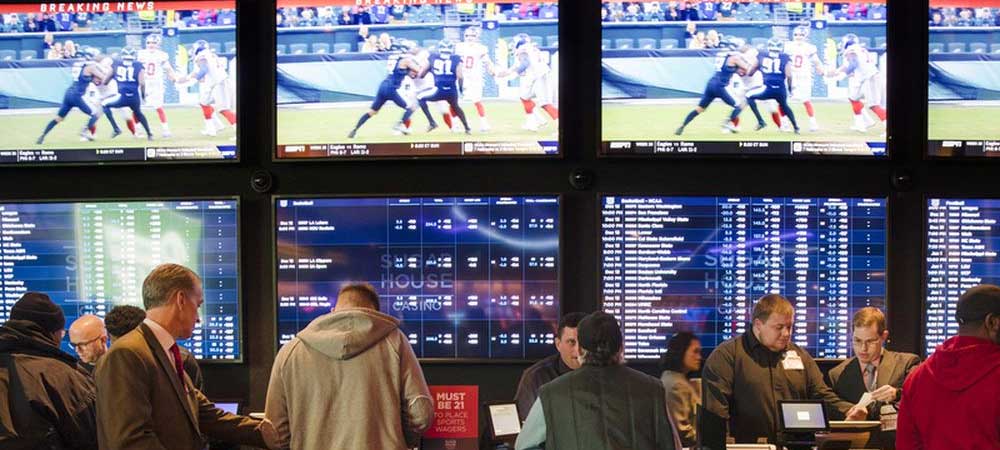- During the NFL playoffs, sports betting revenues in New York varied wildly from week-to-week.
- The combination of a small number of games and a large number of bets allowed for this variance.
- These weekly revenue figures offer a great example of what differentiates sports betting from other forms of gambling.
ALBANY, N.Y. – New York sportsbooks have released revenue reports for the week of the Super Bowl, and it once again highlights the volatility of sports betting in the NFL postseason.
In January and February, the vast majority of betting action revolves around ten NFL playoff games, so the success of a sportsbook can swing wildly based on a handful of results.
During the week of the Divisional Round, for example, New York sportsbooks recorded huge revenues from the Tennessee Titans’ shocking upset of the heavily favored Baltimore Ravens.
Rivers Casino General Manager Justin Moore called it “the best week ever.”
Two of the four in-state commercial casinos with licensed sportsbooks, Rivers and del Lago, recorded their highest weekly revenue to date following that game. Another, the Tioga Downs Casino, recorded its second-highest weekly total to date.
During the Super Bowl, operators experienced even greater peaks and valleys as a quirk of the game’s late Sunday time slot. Because the game didn’t end until 10 o’clock at night on the east coast, many winning bets weren’t cashed until after midnight and were thus counted against the next week’s totals.
All four New York commercial sportsbooks smashed revenue records during the week of January 26 to February 2 and then proceeded to post record losses the following week as winning Super Bowl bets were cashed.
Resorts Casino, for example, totaled roughly $345,000 in revenue the week of the Super Bowl—45.9% more than any previous week. This huge win was then immediately offset by $420,000 in losses the following week.
The Unpredictability Of Sports Betting
Huge week-to-week swings in profitability are par for the course in sports betting, and even more so in regional markets, which experience can experience even greater volatility as a result of local bias.
Over time, the numbers always even out and sportsbooks will collect their fair share, but the potential for short-term losses vastly exceeds that of comparable income sources like slot machines or table games.
To highlight another example from the NFL playoffs, in February 2019, Rhode Island sportsbooks experienced almost $900,000 in monthly losses as a result of the New England Patriots’ upset of the Los Angeles Rams in the Super Bowl.
Delaware books barely managed to break even during that same time frame, recording only $22,000 in February revenue after averaging $1.7 million over the previous five months.
Because New England-area fans flocked to casinos to bet on the hometown Patriots, both states were essentially powerless to protect themselves from heavy losses. Oddsmakers could have set the money line at -900 for the Patriots and still would have lost money on the sheer volume of winning bets.
This volatility means that the only businesses that can afford to launch sportsbooks are those that already have significant financial backing and other lucrative revenue streams.
The silver lining to all this is that it’s concrete proof that smart and legal sports bettors can beat the house, which can’t be said about comparable forms of gambling.
Advertising Disclosure
In order to provide you with the best independent sports betting news and content LegalSportsBetting.com may receive a commission from partners when you make a purchase through a link on our site.
News tags: Delaware | New England Patriots | New York | NFL | NFL Playoffs | Rhode Island | Rivers Casino

With a dual background in English and sports performance and business analytics, Carter aims to write stories that both engage and inform the reader. He prides himself on his ability to interweave empirical data and traditional narrative storytelling. When he isn’t keeping readers up to date on the latest sports betting legal news, he’s banging his head against a wall regretting his decision to be a Tampa Bay Buccaneers fan.


 Bitcoin Sports Betting Sites
Bitcoin Sports Betting Sites Best Online Sports Betting
Best Online Sports Betting Famous Sports Bettors
Famous Sports Bettors States With Legal Sports Betting
States With Legal Sports Betting Sports Betting Events
Sports Betting Events




